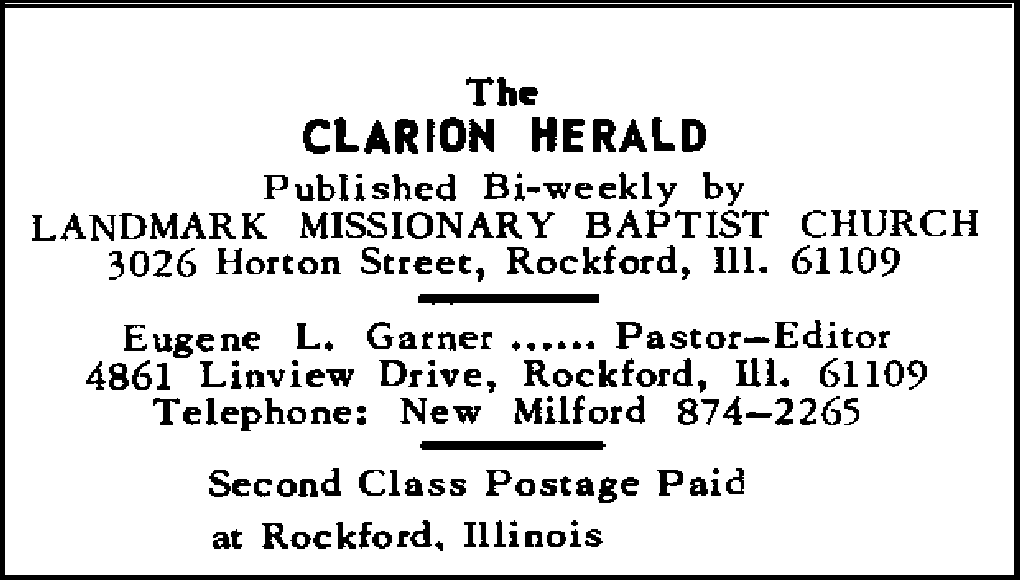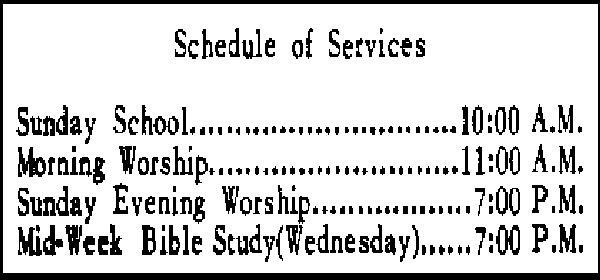
|
 |
 |
 |
|
 
|
|
|
BLESSING & DIRECTION FOR A NEW YEAR
"The Lord bless thee and keep thee: The Lord make His face to shine upon thee, and be gracious unto thee: The Lord lift up His countenance upon thee, and give thee peace", (Num. 6:24-26).
At this time of year it has become the "proper" thing to bid one a "Joyous Holiday Season" and "A Happy and Prosperous New Year". Our hearts are full of generous feelings and good wishes for all we meet; and it is a pity that we cannot maintain such a spirit through out the year.
But what may we do to give them a Happy New Year? We certainly cannot compel such a fortunate adjustment of circumstances as to produce happiness. Even if we could, we have no way of knowing what would be the truest and best things for the good of those we love.
Surely the best thing we can do is to ask God's blessing on those we love -- trusting His unerring wisdom to order the best thing possible in every situation.
So, for the members of Landmark Church, and readers of the CLARION HERALD, I pray that the Lord may richly bless, keep and sustain you in the days to come. And I am grateful for each thoughtful remembrance and your faithful prayers in my behalf. I need your prayers! E.G.
|
|
|
|
FOR SUCH A TIME AS THIS
There is great wisdom in the word of Mordecai to Esther, his niece: "Who knoweth whether thou art come to the kingdom for such a time as this?" (Esther 4:14),
Esther's main purpose in the palace of Ahasuerus, as his queen, was that she might intercede for her people. She was not there by accident; nor was she there by her own design. She was there through the providence of God.
We live under that same providence; nothing is accidental about our circumstances. If true to God, we will ever be where He wants us, with some specific task before us. We may wonder at the strange ways of His providence, but there is a key to this mystery.
It was surely a strange providence that brought Esther, the lowly, simple hearted Jewish maiden, into the palace of Artaxerxes; but there was a divine purpose in it. She was sent there because that was where she would be needed by and by. And when God seems to bring us into some strange or peculiar situation, it would be well to remember that He has a purpose in it. Let us be careful to recognize, and faithful to fulfil, the particular task that he sets before us. So doing, we may bless and enrich more lives than we ever imagined possible.
|
|
|
|
|
HONORABLE LIVING & TRUE GREATNESS
Self-seeking and self-promoting men are ultimately brought to dishonor and shame. Man was not made to direct his own steps, plan his own improvement, or manipulate God into doing what he wants done. It is ever God's desire to bring His children to positions of honor -- even to share with them His glory. But this is accomplished only as their lives are yielded to His order. Promotion comes from above.
It is important that we learn to give honor where it is due. According to God's order, such honor is due to the Heavenly Father, to Jesus Christ, to the Holy Spirit, to one's earthly parents, to all who are in authority, to spiritual leaders "who watch for your souls" -- always preferring one's brethren.
Before one can render proper honor to others it is necessary to recognize his own unworthiness -- learning to live humbly before God and men. Such a life God both commands and commends. He ever holds before us an array of great men who have so walked before Him -- Jacob,
|
|
|
|
David, Solomon, John the Baptist, the centurian, and Paul, (Gen. 32:10; 2 Sam. 7:18; I Kings 3:7; Matt. 3:14; 8:8; I Tim. 1:15).
Caution must be exercised to clearly distinguish between true honor and that which is superficial, True honor comes from God, (I Kings 3:13; Psa. 91:15; Dan. 5:18). Earthly honor is defective and degrading; the glory of men is short-lived, (Num. 22:17; Dan. 2:6; John 5:44; Psa. 49:12, 17; Isa. 5:14; Hos. 4:7; 9:11; I Pet. 1:24).
Real greatness comes through a proper evaluation of what is true and a yielding up of one's life in unselfish service to others. It is important that we learn to profit from instruction and reproof, (Pro. 13:18; 29:1). We must learn to walk uprightly before God and men, (Pro. 21:21; Rom. 2:10). True greatness is evidenced by a life of loving and joyful service to others --teaching, (Matt. 5:19); ministering (Matt. 20:26); and serving, (Matt. 23:11). The supreme example of true greatness is Jesus Christ Himself, (Matt. 29:28; Phil. 2:5-11).
For whom are YOU living? What is your goal in life? Is it worth while? Will it last? Or will it make you a dwarf for eternity? Is it not time that each of us fully renounced self and desired "Jesus only" as our goal? With Him we have all things that pertain unto life and godliness. But the most important question is: DOES HE HAVE US? Is the throne of our hearts truly yielded up to His Lordship? The answer to that question makes an eternity of difference!
*****
Let us not murmur or complain:
'Not a single shaft can hit,
Till the God of love sees fit.'
|
|
|
|
ROLLING AWAY THE REPROACH OF EGYPT
(Based on Joshua 5:1-12)
Israel has crossed the Jordan on dry land -- a manifest token of the Lord's power in her behalf. When the report of this crossing reached the kings of the Amorites and Canaanites their hearts melted with fear, and their spirit to resist departed. They now recognized that their defeat was inevitable, for who could resist the power of nature's God?
Circumcision was a vitally important rite for ancient Israel. Its roots reached back to Abraham, (Gen. 17:9-13). It served as a sign of Israel's covenant relationship with God. It was a mark of separation, identification and dedication. Failure to obey the ordinance of circumcision would result in a breach of the covenant and their severance from the covenant-position, (Gen. 17:14; comp. Jn. 15:1-14; Matt. 18:15-19).
At times in Israel's history the sign of the covenant was sorely neglected --- its importance minimized as the nation forsook her Lord (Josh. 24:14; Ezek. 20:7-11; 23:1-3). This seems to have been the case during the bondage in Egypt. When it is said that "God remembered" His covenant, it is implied that Israel had forgotten, (Ex. 2:24; 6:5). Even Moses failed to circumcise his sons in Midian, (Ex. 4:24-25).
There is some indication that there had been a wholesale circumcising in Egypt just before the exodus, as preparations were made for the Passover, (Ex. 12:43-51). This may have taken place under the divine protection afforded by the three days of darkness, (Ex. 10:21
|
|
|
|
23). It is stated that all the men who came out of Egypt were circumcised, (Josh. 5:5). The command to "circumcise AGAIN the children of Israel a second time", (Josh. 5:2), suggests that there had been a "first" time when there was a nation wide fulfillment of the divine command.
Being a sign of covenant relationship, circumcision is meaningless where that relationship does not exist. The elder members of Israel had rebelled against God at Kadesh - Barnea, (Psa. 95:11; Num. 14:32-34). Therefore, God cast them off. The promise of entering the land was withdrawn from them. They had broken the covenant; the symbol of hope and promise was, henceforth, meaningless to them.
Disinherited, and walking in unbelief, circumcision did not mean anything to the generation that fell in the wilderness, (Num. 14: 11-12). (So, baptism, the symbol of covenant - relationship today, is meaningless to those who are not willing to walk in faith obedience before God.) The rebellious were cut off from divine fellowship, but God was merciful toward their children who had not so hardened their hearts.
Dedication to, and identification with, the God of Abraham, Isaac and Jacob was necessary if they were to have victory in Canaan. Care must be taken to circumcise every male in Israel -- symbolizing their dedication to God, and demonstrating their confidence in His fellowship and future blessing.
Only "sons of the covenant" were permitted to participate in the Passover Feast. This suggests that the circumcising must have taken place almost immediately after the
|
|
|
|
|
crossing of Jordan, for the Feast was observed four days after the passage. Pointing back to the substitution of the Passover Lamb, and forward to the coming "Lamb of God" the Passover was designed to inspire faith and hope in the nation -- unwavering reliance on her faithful, covenant-God.
The Egyptians had scorned Israel in the wilderness -- declaring that God had forsaken her. At Gilgal the nation renewed its covenant vows and, by God's mercy, was vindicated. Henceforth she will eat "the old corn of the land". The manna (representing Christ come down to meet our need at Calvary) ceased that very day. Henceforth they may feast on the "fruit of the land" (signifying Christ's resurrection for the eternal sustenance of those who are now being "saved by His life").
This lesson is rich in applications for our day. It suggests the necessity of identity with Christ in His death, burial and resurrection. Following repentance and faith baptism SYMBOLIZES the washing away of our sins and the recognition of Jesus' Lordship over our lives. Un-
|
|
|
|
LIVING FOR OTHERS
"We then that are strong ought to bear the infirmities of the weak and not to please ourselves", (Rom. 15:1).
'If there be some weaker one,
Give me strength to help him on:
If a blinder soul there be,
Let me guide him nearer Thee.
Make my mortal dreams come true
With the work I fain would do;
Clothe with life my weak intent,
Let me be the thing I meant:
Let me find in thy employ
Peace, that dearer is than joy;
Out of self to love be led
And to heaven acclimated,
Until all things sweet and good
Seem my natural habitude.
-- J. G. Whittier
*****
til this condition is met, no one may rightly approach His table -- to eat His flesh and drink His blood -- which is necessary to sustain a faithful walk and keep alive the blessed hope of His glorious appearing. (Condensed from my "Outline Studies in Joshua", to be published in 1971) E.G.
|
|
The CLARION HERALD
3026 Horton Street
Rockford, Illinois 61109
|
|
Second Class Postage Paid
at Rockford, Ill.
|
|
|
|
|
 |
 |
 |
|



